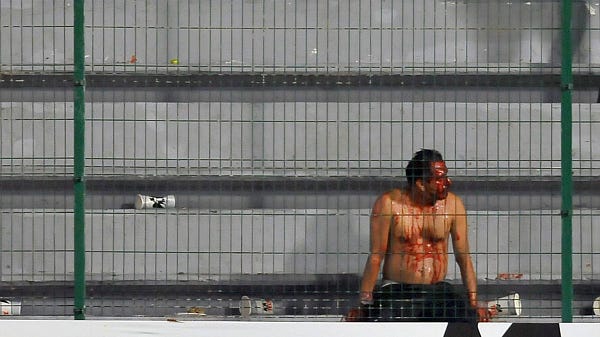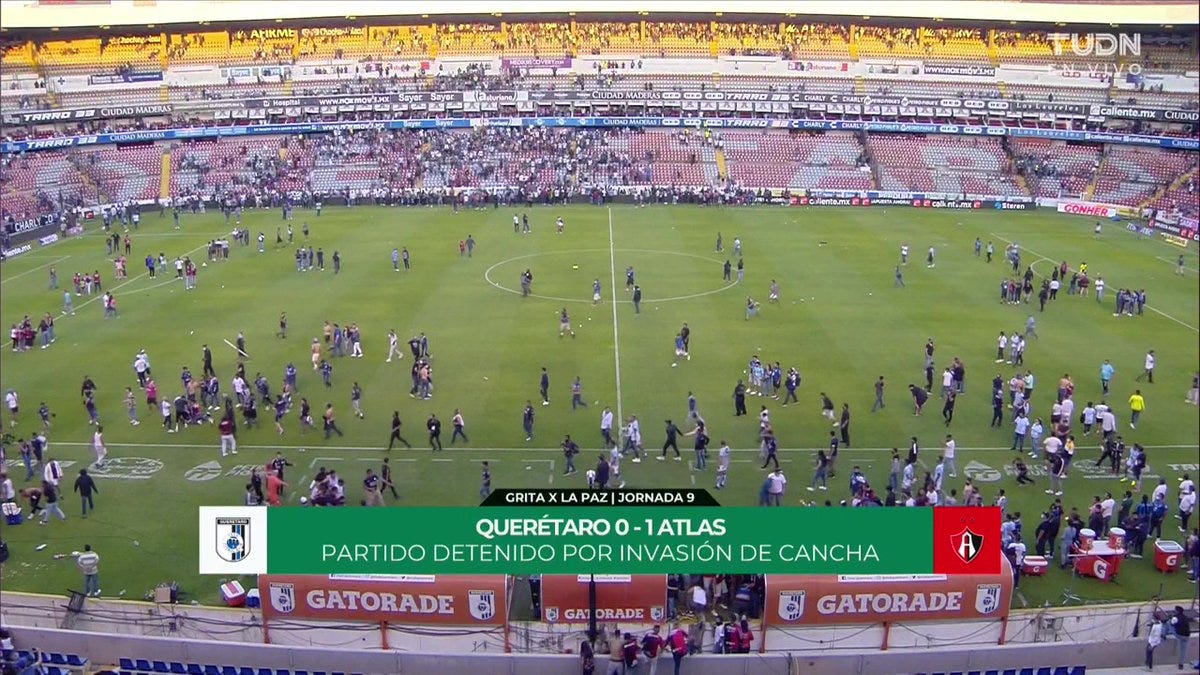🇲🇽 Scenes of violence in Queretaro all too familiar for many in Mexico
A dark day for the sport has echoes of everyday life
Getting CONCACAFed is a newsletter sharing stories and analysis from the Concacaf region.
I write and report on stories others overlook, with a special focus on covering Mexican soccer in English.
Sports and society are intertwined.
No matter how many Stick To Sports reply guys on Twitter want to separate the two, you can’t have sports without politics.
Games like soccer often do provide a beautiful distraction from frustration, from fear, from the difficulties of everyday routine that so often can weigh us down.
Yet trying to separate sports from what is happening around us, removing them from the context of ‘real life’ is a fool’s errand, like trying to take two eggs out of a birthday cake. Once it’s all whipped in, there’s no separating the strands.
Scenes of inhumane violence taking place at Saturday night’s Queretaro-Atlas match, sending fans streaming onto the field to seek refuge and suspending the game with a half-hour to play, were a disturbing echo of the violence permeating so much of Mexican society today.
The responsible parties are clearly the Queretaro barra members who punched, kicked and used makeshift weapons to inflict harm on their counterparts. But officials in Mexico, both in sports and in the government, have allowed this climate to exist for far too long and must recognize Saturday’s disgraceful scenes as a last straw.
At the start of the game, it seemed like a festive atmosphere. Atlas fans made their presence known at the Estadio Corregidora, with commentators saying it may have been 50-50 between fans of the current Liga MX champion and the home team. The mood quickly turned dark, with the ‘barras’ of the clubs coming together and Queretaro fans ruthlessly attacking Atlas fans.
The police? They weren’t there, with only woefully under-prepared private security, another echo of so many Mexicans’ experience.
Of course this wouldn’t have happened outside the atmosphere of a sporting event. The horrible cocktail of alcohol, machismo and a misplaced feeling of identity in ‘protecting’ your barra, your city or your region so often has terrible results. We can’t pretend our sport doesn’t sometimes ferment and even encourage many of these feelings.
But it also spills over from the violence Mexicans live with as a society, violence that often comes from a place of powerlessness, from frustration with the system, from feeling there is a lack of options when it comes to finding a job or keeping your family safe.
I love Mexico. It’s a place I’ve called home, where I’ve worked games for a decade, where I’ve made many close friends and had so many wonderful experiences. It hurts to see these things happen.
The stats, however, are clear. It is dangerous to live in Mexico. This is especially true if you are a woman, a member of the LGBTQ community, a journalist or have any other number of labels applied to you.
At the moment, we don’t know exactly how many people are seriously hurt or even if any have lost their lives. Both David Medrano and “El Francotirador” each have said unofficial sources tell them there an excess of a dozen deaths. Many videos and images from the stands, which are found on social media and which I will not be linking here, do not look good.
No deaths have been confirmed, however, as I write this just after 8:30 a.m. Central time.
The state of Queretaro’s Civil Defense organization reported 22 male Atlas fans taken to the hospital, two of them in critical condition. Queretaro governor Mauricio Kuri said the number is down to 14 hospitalized. An official in the office of the governor of Queretaro also said there currently are no deaths.

A list of Atlas fans taken to the general hospital has been published, with other fans reported missing located in the hospital, on the bus back to Guadalajara or where they were staying in Queretaro.

The search continues on Atlas fan Facebook and Twitter pages.
It feels far too good to be true, but I pray the government’s account is accurate, that everyone involved in the incident leaves with their health. I fear, however, we’ll soon hear the stories of those who don’t make the bus back.
Even this confusion is part of the experience of living in Mexico.
This week, a video circulated showing a mass execution outside a funeral in a small town in Michoacán. The date and the location were not in doubt. Yet reporters struggled to find proof of the act taking place. Authorities, unable or unwilling to find the bodies, couldn’t provide exact details of the number of dead or explain why it took police five hours to respond to the scene.
It was impossible not to think of the type of violence carried out by organized crime groups when watching the videos from Saturday’s game.
The violence for violence’s sake, the pleasure that sickly seemed to come with it, and even the nudity, as members of the Queretaro barra sought to humiliate and dehumanize their targets.
Those images will be all too familiar to Mexicans who have seen men’s naked bodies hanging from bridges or corpses callously tossed into shallow graves, marked by a message of warning to rivals, police or journalists.
The attorney general in Queretaro plans to bring charges of attempted murder.
Liga MX president Mikel Arriola promised “unprecedented penalties for these violent acts that are not part of our soccer,” but there is no denying that, at least Saturday, it was part of Mexican soccer.
And the league played on.
The two tweets following the league’s statement on the violence announced kickoff of the next two matches. The tweet after those was even more surreal.
In a country in which 33,308 people were killed in 2021 and an untold more have been disappeared or displaced, players stood in front of a banner reading “Shout for Peace,” part of a pre-match protocol developed this week to show opposition not to violence in the stadiums or the streets where Liga MX operates but in Ukraine.


Arriola, who ran as the Partido Revolucionario Institucional candidate for Mexico City’s head of government in 2018, expressed concern and condemned the violence but didn’t suspend matches until Saturday’s slate was over, with Sunday’s games pushed back.
As I move deeper into my 30s, there are times when I look into the mirror and see my shirt fitting too tight or my hairline less robust than I’d hope.
Sports once again held a mirror up to Mexican society Saturday night. No one likes the images they saw.
When I see things about myself I don’t like, I have a few choices. I can diet. I can exercise. I can buy new shirts. I can try a new hairstyle. Or I can pretend the problem doesn’t exist, likely meaning it will get that much worse.
It’s easier to make individual choices than to effect societal change, yet what is societal change but the sum of thousands of individual choices?
There is no excuse for the behavior of those who committed violent acts Saturday. That they live in a violent society does not mean they could not have made the correct choice as individuals to do the right thing, not to turn to abuse or trying to stop others when it was clear the situation was out of hand
Arriola, the league’s owners and the Mexican politicians who have allowed things to get to this point have to make their choices as well.
“We energetically condemn what happened tonight, and our commitment is to act and make sure there is no impunity when it comes to these unfortunate acts,” Arriola said.
Yet too often in Mexico, there is no punishment for those who commit serious crimes.
Andrés Manuel López Obrador (AMLO), the current president of Mexico, has promised that there will be no impunity for those who murder journalists in a country where seven reporters have been killed in the first two months of 2022. Maybe so, but think tank México Evalúa released a report last year saying 94.8% of violent crimes committed in Mexico went unpunished.
AMLO has championed an “Abrazos, no balazos” policy torward organized crime. It has been as ineffective or moreso than all his predecessors’ efforts since Felipe Calderón declared war on the cartels by sending the army to Michoacán in 2006. It’s clear what he and the rest of Mexico’s leaders are trying isn’t working.
The same can be said of soccer officials.
We’ve never seen violence of the scale we saw Saturday before in Liga MX, but it’s hardly the first time we’ve watched ugly scenes.
There were incidents in Week 2 of this season at Pachuca, last season when Club América met Pumas, by Queretaro fans against rival San Luis in 2019, in the Clásico Regio in 2018, and in 2015 when Atlas and Chivas met in the playoffs and fans ended on the field. Oh, and in 2017, traveling Tigres fans mixed it up with Veracruz supporters, and I wrote this:


If more leaders in Mexico don’t stand up and say, “Enough,” to the violence that plagues society, we will keep seeing images of violence and bloodshed - in the streets and in the stadiums.






